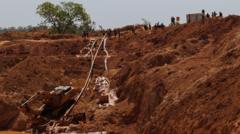The incident highlights the perilous conditions faced by miners in unregulated operations as the nation grapples with the fallout of its mining practices.
Tragedy Strikes Mali as Illegal Gold Mine Collapse Claims Over 40 Lives

Tragedy Strikes Mali as Illegal Gold Mine Collapse Claims Over 40 Lives
More than 40 people, predominantly women, have lost their lives in a catastrophic illegal gold mine collapse in Mali's Kayes region.
More than 40 individuals, mostly women, tragically perished when an illegal gold mine collapsed near Kenieba, in Mali's gold-rich Kayes region on Saturday. The victims were reportedly scavenging for remnants of gold in open-pit areas left by industrial miners when the collapse occurred, according to a local gold miner's union leader in statements to Reuters.
Conflicting reports have surfaced regarding the official death toll, with local police indicating that 48 people were killed, while industry union representatives cited 43 victims. Eyewitness accounts detail harrowing scenes, including a woman with her baby who fell into the water during the disaster.
This devastating incident marks Mali's second deadly mining accident in just three weeks, following a flooding incident in late January that resulted in at least 10 fatalities. Sadly, accidents are all too common in Mali due to limited regulation and the use of unsafe mining practices.
A spokesperson from Mali's mines ministry confirmed the occurrence of the collapse between Kenieba and Dabia but refrained from providing additional details. Ministry teams were reported to be compiling a report at the site. The collapse happened at a disused mine previously operated by a Chinese company.
Mali is known as one of the world’s largest gold producers, and mining activities are critically important to its economy. However, the sector suffers from inadequate regulations and oversight. Just over a year ago, a similar tunnel collapse resulted in the deaths of at least 40 miners.
This unfortunate incident comes as Mali's government faces ongoing disputes, particularly regarding revenue sharing with foreign mining entities. Last month, authorities seized gold bars valued at $245 million from Barrick, a Canadian mining operation, and issued an arrest warrant for the company's CEO, Mark Bristow, who expressed confidence in a resolution during an interview with Bloomberg.
Mali continues to deal with the complex consequences of its mining industry, demanding a closer examination of safety standards and regulations to protect vulnerable workers.
Conflicting reports have surfaced regarding the official death toll, with local police indicating that 48 people were killed, while industry union representatives cited 43 victims. Eyewitness accounts detail harrowing scenes, including a woman with her baby who fell into the water during the disaster.
This devastating incident marks Mali's second deadly mining accident in just three weeks, following a flooding incident in late January that resulted in at least 10 fatalities. Sadly, accidents are all too common in Mali due to limited regulation and the use of unsafe mining practices.
A spokesperson from Mali's mines ministry confirmed the occurrence of the collapse between Kenieba and Dabia but refrained from providing additional details. Ministry teams were reported to be compiling a report at the site. The collapse happened at a disused mine previously operated by a Chinese company.
Mali is known as one of the world’s largest gold producers, and mining activities are critically important to its economy. However, the sector suffers from inadequate regulations and oversight. Just over a year ago, a similar tunnel collapse resulted in the deaths of at least 40 miners.
This unfortunate incident comes as Mali's government faces ongoing disputes, particularly regarding revenue sharing with foreign mining entities. Last month, authorities seized gold bars valued at $245 million from Barrick, a Canadian mining operation, and issued an arrest warrant for the company's CEO, Mark Bristow, who expressed confidence in a resolution during an interview with Bloomberg.
Mali continues to deal with the complex consequences of its mining industry, demanding a closer examination of safety standards and regulations to protect vulnerable workers.





















